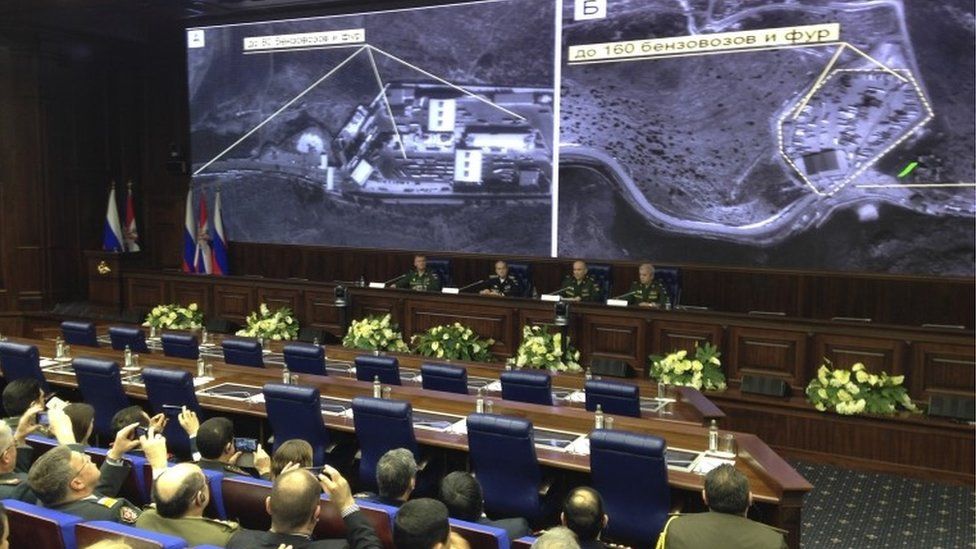Turkey's Erdogan says Russia IS oil trade claims are 'slander'
- Published

Turkish President Recep Tayyip Erdogan has dismissed Russian claims he is benefiting from the oil trade with the Islamic State group as "slander".
Russia has said Turkey is the biggest buyer of oil smuggled from IS-held territory, accusing Mr Erdogan and his family of direct involvement.
But the Turkish president said he would resign if such allegations were proved.
Russia and Turkey are locked in an angry spat over the downing of a Russian fighter jet by Ankara.
Responding to the allegations, Mr Erdogan said "no one has a right to engage in slander against Turkey by saying that Turkey is buying oil from Daesh [IS]".
But he added he did not want to see relations with Russia worsen further.
Earlier, Russia's defence ministry displayed satellite images it said showed columns of trucks loaded with oil crossing from IS territory in Iraq and Syria into Turkey.
"According to available information, the highest level of the political leadership of the country, President Erdogan and his family, are involved in this criminal business," Deputy Defence Minister Anatoly Antonov told the briefing in Moscow.
Russia said it was producing only "part of the evidence" for now and did not provide direct proof of their claim that Mr Erdogan and family were involved.
The US has also rejected the allegations. "We just don't believe that to be true in any way, shape or form," a State Department spokesman said.
Russian President Vladimir Putin has already accused Ankara of downing the plane on its Syrian border to protect oil supply lines.
War of words continues - Steve Rosenberg, BBC News, Moscow
The Russian defence ministry does not usually invite foreign journalists to its media briefings on Syria. But on Wednesday it made an exception.
It had a message it wanted the whole world to hear: that the faces of Turkey's leaders, including President Erdogan, were "smeared with stolen oil".
Invited journalists and military attaches were shown satellite images and grainy video footage, purporting to show tanker trucks with oil crossing from IS-held territory into Turkey.
But, from what I could tell, no evidence was presented to implicate the Turkish president. He has accused Russia of slander.
After the shooting down of the Russian bomber by Turkey last week, the war of words continues between Moscow and Ankara.
Listening to the military officials at this briefing, you could hear the anger in their voices. Their strong language reflects their president's conviction that Turkey has "stabbed Russia in the back".
Turkey said the Russian SU-24 fighter plane intruded into its airspace and ignored repeated warnings to leave.
Russia and Turkey have important economic ties, and in the wake of the incident Moscow imposed visa requirements for Turkish visitors, and placed restrictions on trade with Ankara.
Who is buying oil from Islamic State?
Mr Erdogan on Wednesday called Russia's response "disproportional" and said Turkey would take their "own measures" if they continued, without specifying what they would be.
Despite the tensions Russian Foreign Minister Sergei Lavrov has said he is prepared to meet Turkish counterpart Mevlut Cavusoglu at a security conference in Serbia this week.
It would be the first time the men have met since the downing of the jet.